_(cropped).png.webp)
The premier of British Columbia is the first minister for the Canadian province of British Columbia. The province was a British crown colony governed by the governors of British Columbia[1] before joining Canadian Confederation in 1871.[2] Since then, it has had a unicameral Westminster-style parliamentary government, in which the premier is the leader of the party that controls the most seats in the legislative assembly. The premier is British Columbia's head of government, and the king of Canada is its head of state and is represented by the lieutenant governor of British Columbia. The premier picks a cabinet from the elected members to form the Executive Council of British Columbia and presides over that body.[3]
Members are first elected to the legislature during general elections. General elections must be conducted every four years from the date of the last election. An election may also take place if the governing party loses the confidence of the legislature by the defeat of a supply bill or tabling of a no-confidence motion.[3]
Before 1903, British Columbia did not use a party system; instead, premiers of British Columbia had no official party affiliation and were chosen by elected members of the legislative assembly from among themselves. Candidates ran as "Government", "Opposition", "Independent", or in formulations such as "Opposition independent", indicating their respective positions to the incumbent regime.
British Columbia has had 36 individuals serve as premier since joining Confederation, of which 14 individuals had no party affiliation, three were Conservatives, eight were Liberals, four were Socreds, and seven were New Democrats. The first premier was John Foster McCreight, who was inaugurated in 1871. Joseph Martin spent the shortest time in office, at 106 days. At over twenty years, W. A. C. Bennett spent the longest time in office and is the only premier to serve in more than five parliaments. The incumbent premier is David Eby, who was sworn in on November 18, 2022.
Premiers of British Columbia
| No. | Portrait | Name (Birth–Death) |
Term of office | Electoral mandates (Assembly) | Political party | Riding | Cabinet | Ref. | ||
|---|---|---|---|---|---|---|---|---|---|---|
| 1 | 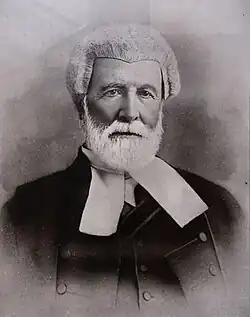 |
John Foster McCreight (1827–1913) |
14 November 1871 |
23 December 1872 |
Title created (caretaker government)
|
Non-partisan | MLA for Victoria City | |||
| 2 |  |
Amor De Cosmos (1825–1897) |
23 December 1872 |
11 February 1874 |
Appointment (1st Leg.) | Non-partisan | MLA for Victoria | |||
| 3[lower-alpha 1] (1 of 2) |
 |
George Anthony Walkem (1834–1908) |
11 February 1874 |
1 February 1876 |
Appointment (1st Leg.)
|
Non-partisan | MLA for Cariboo | |||
| 4 |  |
Andrew Charles Elliott (1829–1889) |
1 February 1876 |
25 June 1878 |
Appointment (2nd Leg.) | Non-partisan | MLA for Victoria City | |||
| 5[lower-alpha 1] (2 of 2) |
 |
George Anthony Walkem (1834–1908) |
25 June 1878 |
13 June 1882 |
1878 election (3rd Leg.) | Non-partisan | MLA for Cariboo | |||
| 6 |  |
Robert Beaven (1836–1920) |
13 June 1882 |
29 January 1883 |
1882 election (4th Leg.) | Non-partisan | MLA for Victoria City | |||
| 7 | 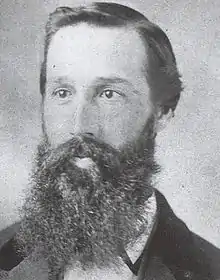 |
William Smithe (1842–1887) |
29 January 1883 |
28 March 1887 |
Appointment (4th Leg.)
|
Non-partisan | MLA for Cowichan | |||
| 8 | 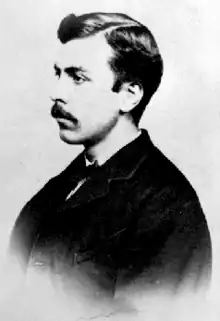 |
Alexander Edmund Batson Davie (1847–1889) |
1 April 1887 |
1 August 1889 |
Appointment (5th Leg.) | Non-partisan | MLA for Lillooet | |||
| 9 | 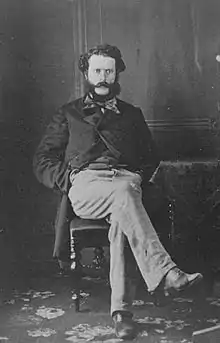 |
John Robson (1824–1892) |
2 August 1889 |
29 June 1892 |
Appointment (5th Leg.)
|
Non-partisan | MLA for New Westminster (1889–1890) MLA for Cariboo[lower-alpha 2] |
|||
| 10 | 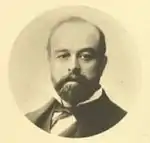 |
Theodore Davie (1852–1898) |
2 July 1892 |
4 March 1895 |
Appointment (6th Leg.)
|
Non-partisan | MLA for Cowichan-Alberni | |||
| 11 |  |
John Herbert Turner (1834–1923) |
4 March 1895 |
15 August 1898 |
Appointment (7th Leg.) | Non-partisan | MLA for Victoria City | |||
| 12 |  |
Charles Augustus Semlin (1836–1927) |
15 August 1898 |
28 February 1900 |
1898 election (8th Leg.) | Non-partisan | MLA for Yale-West | |||
| 13 |  |
Joseph Martin (1852–1923) |
28 February 1900 |
15 June 1900 |
Appointment (8th Leg.) | Non-partisan | MLA for Vancouver City | |||
| Immediately lost a confidence vote 28 to 1 upon being appointed but formed a cabinet and governed for another three months anyway. | ||||||||||
| 14 | 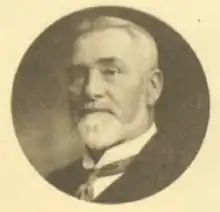 |
James Dunsmuir (1851–1920) |
15 June 1900 |
21 November 1902 |
1900 election (9th Leg.) | Non-partisan | MLA for South Nanaimo | |||
| 15 | 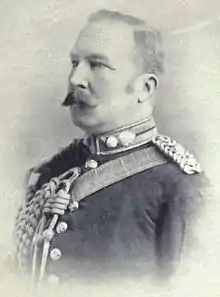 |
Edward Gawler Prior (1853–1920) |
21 November 1902 |
1 June 1903 |
Appointment (9th Leg.) | Non-partisan | MLA for Victoria City | |||
| 16 |  |
Richard McBride (1870–1917) |
1 June 1903 |
15 December 1915 |
Appointment (9th Leg.)
|
Conservative (Ldr. 1903) |
MLA for Westminster-Dewdney (1903) MLA for Dewdney MLA for Victoria City[lower-alpha 3][lower-alpha 4] |
|||
| Led first partisan administration. During First World War, the provincial government purchased and took possession of two submarines to defend the province from the threat of German attack; quickly transferred by order of the federal government to the Royal Canadian Navy in August 1914. Created the province's first university, the University of British Columbia. | ||||||||||
| 17 | 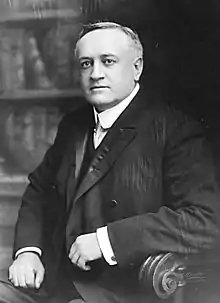 |
William John Bowser (1867–1933) |
15 December 1915 |
23 November 1916 |
Appointment (13th Leg.) | Conservative (Ldr. 1915) |
MLA for Vancouver City | |||
| 18 |  |
Harlan Carey Brewster (1870–1918) |
23 November 1916 |
1 March 1918 |
1916 election (14th Leg.) | Liberal (Ldr. 1912) |
MLA for Victoria City[lower-alpha 5] | |||
| Brought in women's suffrage, instituted prohibition, and combatted political corruption. | ||||||||||
| 19 | 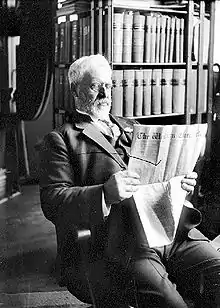 |
John Oliver (1856–1927) |
6 March 1918 |
17 August 1927 |
Appointment (14th Leg.)
|
Liberal (Ldr. 1918) |
MLA for Dewdney (1918–1920) MLA for Victoria City[lower-alpha 6] MLA for Nelson |
|||
| Developed the produce industry in the Okanagan Valley, and tried to persuade the federal government to lower the freight rate for rail transport. In 1923, hosted the visit of Warren Harding to Vancouver, the first ever visit of a sitting United States President to Canada. | ||||||||||
| 20 |  |
John Duncan MacLean (1873–1948) |
20 August 1927 |
21 August 1928 |
Appointment (16th Leg.) | Liberal (Ldr. 1927) |
MLA for Yale | |||
| 21 |  |
Simon Fraser Tolmie (1867–1937) |
21 August 1928 |
15 November 1933 |
1928 election (17th Leg.) | Conservative (Ldr. 1926) |
MLA for Saanich | |||
| Attempted to apply "business principles to the business of government" during the Great Depression hit. Unemployment reached 28% – the highest in Canada. Set up relief camps. The Kidd Report recommended such sharp cuts to social services that the Conservative Party split and decided to run no candidates in the 1933 election. Local riding associations that supported Tolmie ran "Unionist" candidates while those supporting former premier Bowser stood "non-partisan" candidates and others ran as Independent Conservatives, resulting in electoral collapse and only 2 Conservative MLAs (one pro-Bowser, one pro-Tolmie) being returned and Tolmie losing his own seat. | ||||||||||
| 22 |  |
Thomas Dufferin Pattullo (1873–1956) |
15 November 1933 |
9 December 1941 |
1933 election (18th Leg.)
|
Liberal (Ldr. 1929) |
MLA for Prince Rupert | Pattullo ministry | ||
| Attempted to extend government services and relief to the unemployed during the Great Depression. Re-elected in 1937 using the slogan "socialized capitalism". Failed to win a majority in 1941 and removed as leader by his party when he was unwilling to form a coalition government with the Conservative Party to keep the Co-operative Commonwealth Federation out of power. | ||||||||||
| 23 |  |
John Hart (1879–1957) |
9 December 1941 |
29 December 1947 |
Appointment (20th Leg.)
|
Liberal (Ldr. 1941) |
MLA for Victoria City | Hart ministry | [Co.] | |
| Became Liberal leader and premier in order to form a coalition government with the Conservatives, which his predecessor had refused to do, in order to keep the socialist CCF out of power. Undertook an ambitious program of rural electrification, hydroelectric and highway construction. Built Highway 97 to northern British Columbia and relaunched the Bridge River Power Project, which was the province's first major hydroelectric development. Established the BC Power Commission to provide power to smaller communities that were not serviced by private utilities. | ||||||||||
| 24 |  |
Boss Johnson (1890–1964) |
29 December 1947 |
1 August 1952 |
Appointment (21st Leg.)
|
Liberal (Ldr. 1947) |
MLA for New Westminster | Johnson ministry | [Co.] | |
| Introduced compulsory health insurance, and a 3% provincial sales tax to pay for it, expanded the highway system, extended the Pacific Great Eastern Railway, and negotiated the Alcan Agreement, which facilitated construction of the Kenney Dam. Coalition government collapsed when Conservatives left to form the Official Opposition in January 1952, leaving Johnson to lead a straight Liberal government until its defeat in that year's general election. | ||||||||||
| 25 | .jpg.webp) |
W. A. C. Bennett (1900–1979) |
1 August 1952 |
15 September 1972 |
1952 election (23rd Leg.)
|
Social Credit | MLA for South Okanagan | W. A. C. Bennett ministry | ||
| Longest-serving premier. Oversaw rapid expansion of the province's highway system and BC Rail, creation of BC Ferries, BC Hydro, and the Bank of British Columbia, hydro-electric dam-building projects on the Columbia and Peace Rivers and the creation of the University of Victoria and Simon Fraser University. | ||||||||||
| 26 |  |
Dave Barrett (1930–2018) |
15 September 1972 |
22 December 1975 |
1972 election (30th Leg.) | New Democratic (Ldr. 1970) |
MLA for Coquitlam | Barrett ministry | ||
| Reformed the welfare system, established the province's Labour Relations Board, and expanded the public sector. Reformed Legislative Assembly by introducing question period and full Hansard transcripts of legislative proceedings. Brought in the Agricultural Land Reserve (ALR) to protect the supply of farm land and Insurance Corporation of British Columbia to provide public car insurance. | ||||||||||
| 27 |  |
Bill Bennett (1932–2015) |
22 December 1975 |
6 August 1986 |
1975 election (31st Leg.)
|
Social Credit (Ldr. 1973) |
MLA for South Okanagan (1975–1979) MLA for Okanagan South |
B. Bennett ministry | ||
| Implemented significant cuts to social services and education and repealed labour laws, resulting in a general strike. Spent hundreds of millions of dollars on Expo 86 and the construction of BC Place, Vancouver's SkyTrain rapid transit system, and the Vancouver Trade and Convention Centre. Built the Coquihalla Highway. | ||||||||||
| 28 |  |
Bill Vander Zalm (b. 1934) |
6 August 1986 |
2 April 1991 |
Appointment (33rd Leg.)
|
Social Credit (Ldr. 1986) |
MLA for Richmond | Vander Zalm ministry | ||
| 29 |  |
Rita Johnston (b. 1935) |
2 April 1991 |
5 November 1991 |
Appointment (34th Leg.) | Social Credit (Ldr. 1991) |
MLA for Surrey-Newton | Johnston ministry | ||
| 30 | 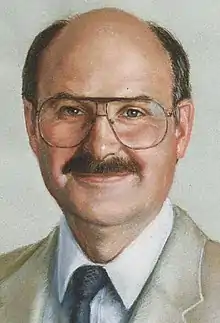 |
Mike Harcourt (b. 1943) |
5 November 1991 |
22 February 1996 |
1991 election (35th Leg.) | New Democratic (Ldr. 1987) |
MLA for Vancouver-Mount Pleasant | Harcourt ministry | ||
| 31 |  |
Glen Clark (b. 1957) |
22 February 1996 |
25 August 1999 |
Appointment (35th Leg.)
|
New Democratic (Ldr. 1996) |
MLA for Vancouver-Kingsway | G. Clark ministry | ||
| 32 |  |
Dan Miller (b. 1944) |
25 August 1999 |
24 February 2000 |
Appointment (36th Leg.) | New Democratic (Ldr. 1999) |
MLA for North Coast | Miller ministry | ||
| 33 | .jpg.webp) |
Ujjal Dosanjh (b. 1947) |
24 February 2000 |
5 June 2001 |
Appointment (36th Leg.) | New Democratic (Ldr. 2000) |
MLA for Vancouver-Kensington | Dosanjh ministry | ||
| 34 |  |
Gordon Campbell (b. 1948) |
5 June 2001 |
14 March 2011 |
2001 election (37th Leg.)
|
Liberal (Ldr. 1993) |
MLA for Vancouver-Point Grey | Campbell ministry | ||
| 35 |  |
Christy Clark (b. 1965) |
14 March 2011 |
18 July 2017 |
Appointment (39th Leg.)
|
Liberal (Ldr. 2011) |
MLA for Vancouver-Point Grey (2011–2013) MLA for Westside-Kelowna MLA for Kelowna West |
C. Clark ministry | [lower-alpha 7] | |
| 36 |  |
John Horgan (b. 1959) |
18 July 2017 |
18 November 2022 |
Appointment (41st Leg.)
|
New Democratic (Ldr. 2014) |
MLA for Langford-Juan de Fuca | Horgan ministry | [lower-alpha 7] | |
| 37 | _(cropped).png.webp) |
David Eby (b. 1976) |
18 November 2022 |
incumbent | Appointment (42nd Leg.) | New Democratic (Ldr. 2022) |
MLA for Vancouver-Point Grey | Eby ministry | ||
| ||||||||||
See also
Notes
- 1 2 Unlike other Canadian jurisdictions, British Columbia's legislative library follows the American convention of giving multiple ordinal numbers to premiers who serve non-consecutive terms. George Anthony Walkem is therefore both the third and fifth premier.
- ↑ In the 1890 election, Robson also won the seat in the riding of Westminster but turned it down.
- ↑ In the 1907 election, McBride also won the seat in the riding of Dewdney but turned it down.
- ↑ In the 1909 election, McBride also won the seat in the riding of Yale but turned it down.
- ↑ In the 1916 election, Brewster also won the seat in the riding of Alberni but turned it down.
- ↑ In the 1920 election, Oliver also won the seat in the riding of Delta but turned it down.
- 1 2 C. Clark's government remained in office after the 2017 election until defeated 44 to 42 on a confidence vote less than a week into the legislative session. The lieutenant governor asked Horgan to form a government on the strength of a confidence and supply agreement between the NDP and the Green Party. Horgan led a minority government for the remainder of the 41st Parliament until the 2020 election, when the NDP attained a majority.
References
- ↑ "History and Heritage of British Columbia". BritishColumbia.com. Archived from the original on November 2, 2008. Retrieved November 5, 2008.
- ↑ "British Columbia – Canadian Confederation". Library and Archives Canada. August 9, 2006. Archived from the original on June 21, 2008. Retrieved November 5, 2008.
- 1 2 "The Office of the Lieutenant Governor and the Legislature – Province of British Columbia". Province of British Columbia. Retrieved November 5, 2008.
General
- "Premiers of British Columbia, 1871–today". Province of British Columbia. Archived from the original on June 4, 2013. Retrieved April 26, 2011.
- "British Columbia". The Canadian Encyclopedia. Retrieved October 8, 2019.
